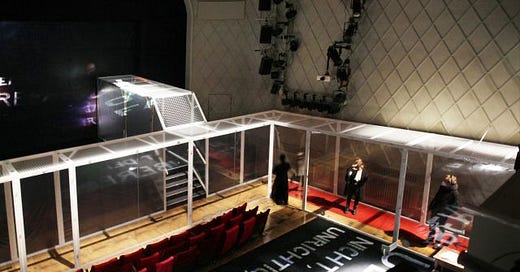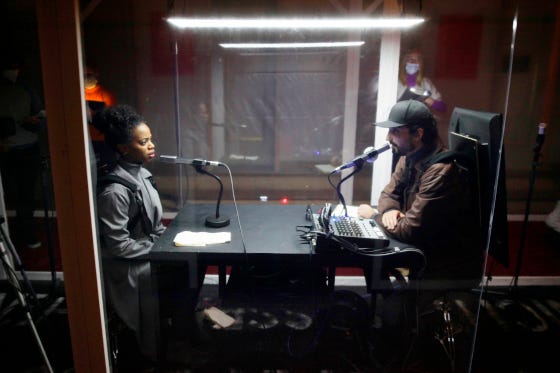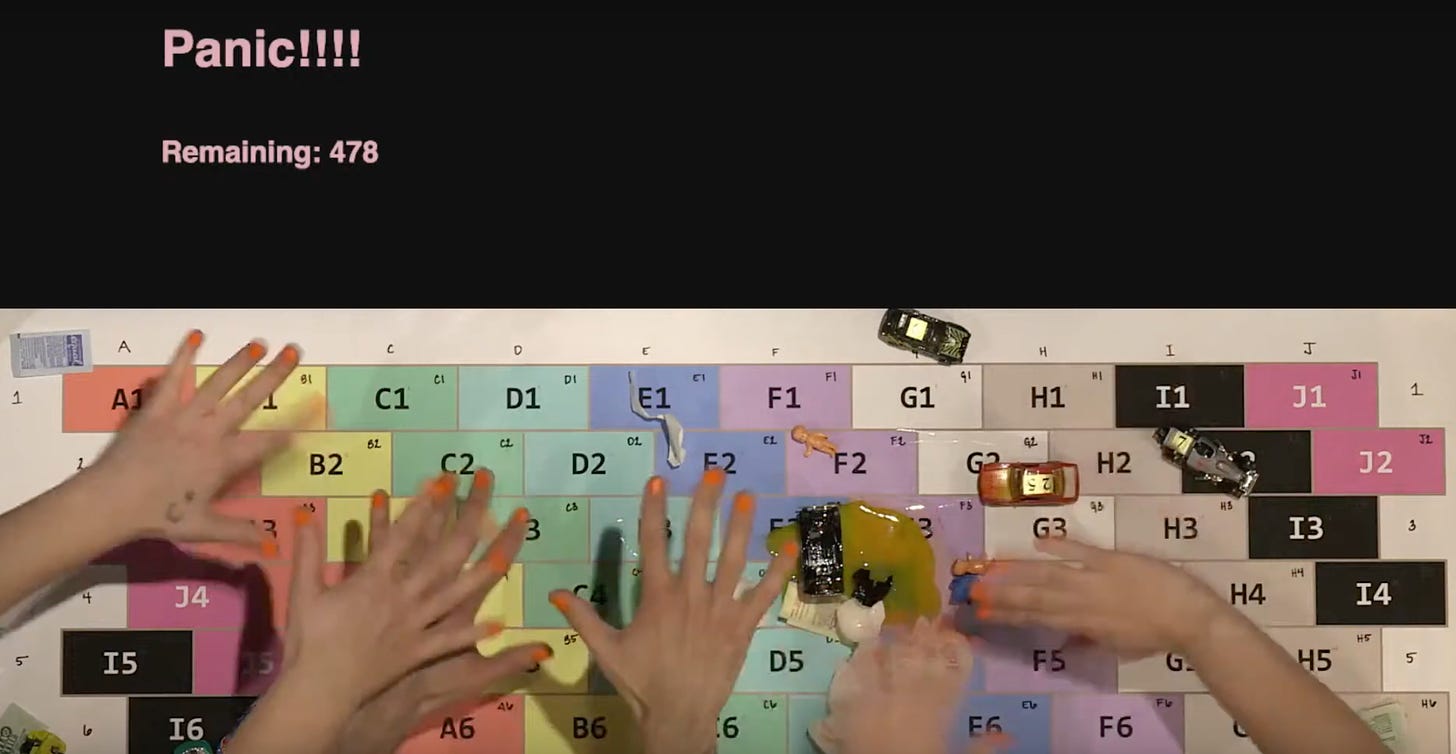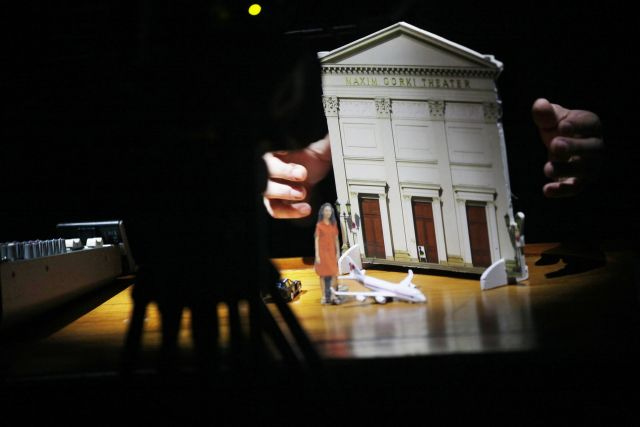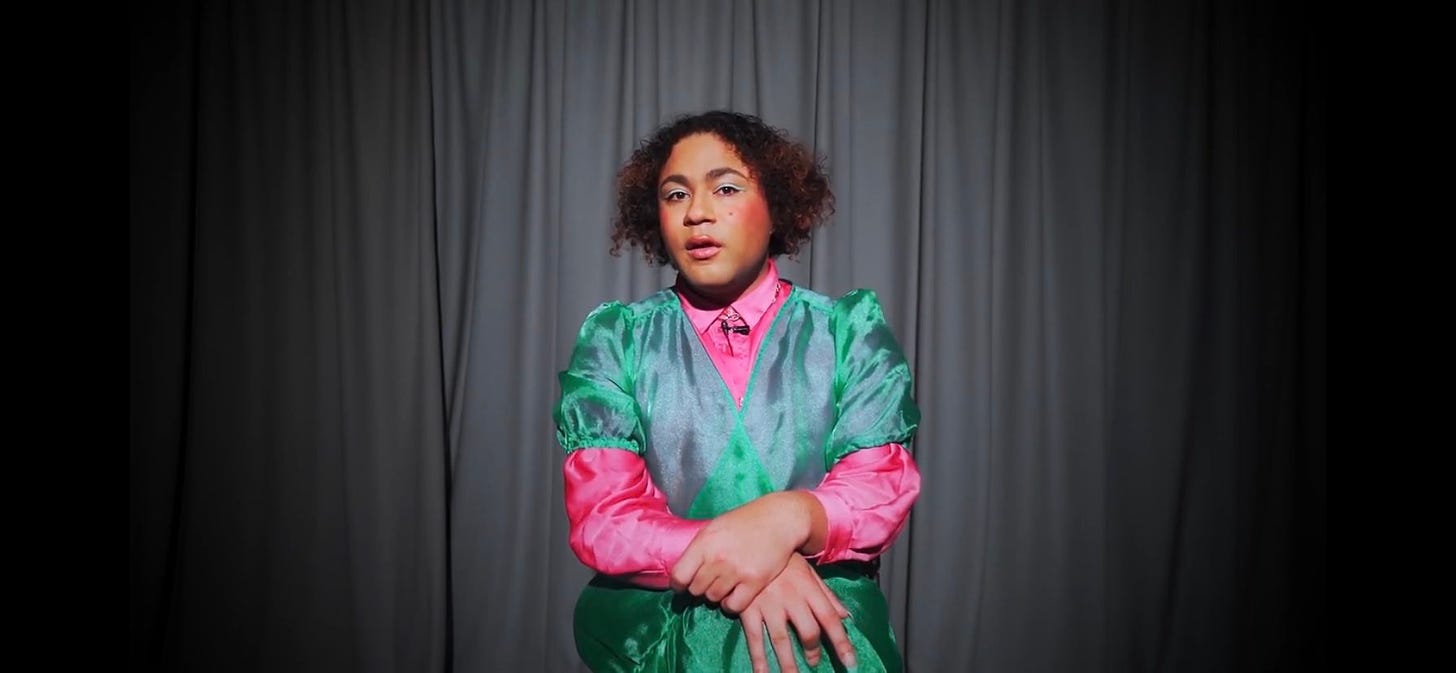Hello everyone!
I’m really excited about this weeks etude as it’s very different. This is the big thing that I’ve been wanting to reveal.
We’re doing reviews now
yay
This is becuase at the tail end of last year, a couple of people supported etude over on my ko-fi page and I wanted to use that support to make etude even better.
For this review, I asked close friend and good review brain James Varney to pick a few shows from previous editions of etude and to write some thoughts down. The plan is to do one review each month so expect that from now on.
There’s no boundaries for the reviews, the reviewer choses what they review and how they review it. And for full transparency, each reviewer will recieve £25.
After the review there will be a smaller selection for this weeks etude.
I hope you enjoy this weeks etude!
TRAFFIC, by Christina Tang
Alles unter Kontrolle, by Oliver Frljić
It must have been told to others, too, have you heard it? That anecdote about a class sitting a test which on the first page instructs them, ‘Before attempting any questions, read the whole paper carefully’. Nearly every student ignores the instruction and works diligently through the paper, answering the questions, while one wise student follows the instruction and finds a new command at the end of the paper: ‘Write your name on the front of your booklet, then close it, answering none of the questions.’
What a cruel trick.
I was told this story more than once when I was in primary school. The moral, of course, which they wanted the child James to learn, is of the danger of not following instructions. We must always listen to the guidance given to us, because those who have power over us are capricious and will humiliate us at any opportunity.
Alles unter Kontrolle and TRAFFIC are performances concerned with rules. TRAFFIC is literally a game; audience members remotely control little toy cars set out on a grid, and attempt to escape the traffic jam – ‘You’re not in traffic, you are traffic.’ Alles unter Kontrolle is a promenade of vignettes, through the body of Berlin’s Maxim Gorki Theater. When each vignette is complete, we are instructed to move along, to the next. I of course have no choice but to obey – I am watching a recording.
We go to the theatre and enter into a social contract anyway; we agree to take certain things for granted and to behave in a certain way (and I don’t mean to invoke those mothball ‘audience etiquette’ bollocks). The performance wouldn’t work if I was, for instance, not watching, trying to break into the next room, answering the performers’ rhetorical questions. I don’t want to ruin it for everyone else.
In the early days of the pandemic, I work in my room all day. Without leaving my room or having seen anyone, I go to the sink and I wash my hands. Again, again. Washing my hands will keep me safe. In Alles unter Kontrolle, the audience travel around the Gorki’s carcass through perspex tunnels, protected from the performers’ breath, sweat and spittle. ‘I can spit on you, but nothing will happen because we’re safe.’ Rules and structure are reassuring. I take for granted the theatre is not lying to me – these tunnels must be safe, they wouldn’t be allowed to have an audience in here otherwise. There are rules. A tunnel guides us from one episode to the next and proves that our presence here has been predetermined; there is a plan, and we are part of it. An actor makes eye contact with the camera lens, they look right at me. They know I’ll be watching, they know they will be seen.
When my car fails to move closer to the exit in TRAFFIC, I reassure myself: there was nothing I could do, there were no free spaces anyway. Though I voted on behalf of my car, though I selected ‘merge right’ or ‘pull forward’, there was no space, what was I expecting would happen?
Sometimes appeals to democracy appear as a compulsion, as rituals we are settled into invoking and enacting to keep ourselves safe. This is performative democracy isn’t it? Something which Liberalism leans on as proof it is doing the right thing. If we write enough tweets, the Metropolitan Police will swap Boris Johnson for a good, kind Prime Minister, and stop savaging women on the telly. If we make sure we vote, often and wisely, the world will become slowly more just. By ‘performative’ I don’t mean that voting isn’t taking place, but that the presence of voting, or the presence of an avatar to shout at, is seen as the presence of democracy. Though necessary, not sufficient.
Similarly, the presence of structure in Alles unter Kontrolle and TRAFFIC is the presence of neither control nor choice. TRAFFIC’s structure gives us choices, which are not guaranteed to be possible, but which we are free to make. Alles unter Kontrolle reassures us every ten minutes: ‘Es ist Alles unter Kontrolle’ – everything is under control. The audience, though, remain steered from room to room, and the performers themselves act on the behalf of Oliver Frljić. We are told a story about Frljić giving one of the actors a section of the show to direct herself, the internal tensions that decision exposed, the creation and abandonment of the section, and how the failure of that freedom was Frljić’s intention all along. Giving his actors the illusion of agency was a ploy to fulfil Frljić’s own artistic vision.
Coincidentally, I came across this quote from Jenny Nicholson today: ‘Give them as little as they are paying you for and assume they are your enemy.’ Coincidentally, my landlord’s letting agency saw fit to schedule a house inspection today. Coincidentally, today I paid my taxes. The greatest freedom allowed the audience of TRAFFIC is use of the chat function on the YouTube live stream and it’s one of the most wholesome chats I’ve ever been part of. Half of it is strangers asking each other to move their fictional cars and apologising to each other that they cannot figure out how to move their fictional cars. The other half is people announcing how much they are enjoying the show and I am one of them.
The chat function allows us to build our own community within the game, within the performance. We commiserate and attempt to bug-fix for those in the chat who can’t control their cars. We celebrate each other’s wins and announce our joy at new twists in the stories shared with us. Some share their own stories about driving and being stuck in traffic. Talking to my housemate about the show the next day, he bemoans that real traffic jams never end up so jovial and we reflect that if only drivers were somehow able to communicate more generously, perhaps they would be. How wistful we are.
When the rules break in TRAFFIC, the game disintegrates. I watch as my car is swapped with someone else’s and I’m at the back of the queue now. I select the ‘ANACONDA’ and ‘Egg’ prompts which have appeared and a rubber snake slithers over the playing board, dislodging cars, before an egg is neatly cracked onto it too. I’m not sure what I was expecting. No hope of driving to the exit now; the other players are summoning earthquakes and sheep in equal measure. Christina Tang and the performers running the game were always the hands of God. Now, they are revealing the game was always a joke – it couldn’t ever last. There’s no real winning, and who knows why we’d want to win anyway? We’re here to play a game, where would we be if our part in the game was over?
There’s always the tantalising thought that, with more information, with an inch more control over my inputs and the order of play, I could escape. It’s the tease that keeps me playing, keeps me considering my next action. It’s the illusion that I am not restrained which keeps me invested in playing the game. Oliver Frljić’s characters are locked in to their roles, too. Palestinian refugee Maryam Abu Khaled is told, ‘We were forced to launch an investigation,’ when she is detained, but that ‘Technically you are still free.’ Technically, she is allowed to leave the interview, but I do not fancy her chances were she to try. Liberty is permitted only beneath a hanging sword. Even her detainee claims his hand is ‘forced’. The structure they are free to improvise within is not so wide.
We are told the content of Maryam’s dream, before watching that description played out as a slow, silent scene in the next room. Even her imagination is captured, relayed for us to examine. At Alles unter Kontrolle’s head, Dominic Hartmann plays a manic, pacing ‘State of Emergency’, invoking Weimar Germany’s Artikel 48, which gave the president power to take ‘emergency measures’ without the consent of the rest of government. The measures designed to protect us are ultimately only temporary and illusory, if they rely on the wisdom and beneficence of those with power over us.
Last month I read the Ursula K Le Guin short story, The Ones Who Walk Away from Omelas. In Le Guin’s story, the only recourse is silence or abandonment for those citizens of Omelas who cannot sanction the atrocity their prosperous home is built upon. And so they one by one walk out into the desert, where no one knows what becomes of them. I allow letting agents into my house in favour of a quiet life. I allow my landlord to increase my rent in favour of a quiet life. I enjoy the theatre which prompts me to resent the laws which in my interest hang over me. It is my right to refuse my letting agents entry, and my right to dispute the increase in rent, but I have not exercised those rights today.
At the time of writing, I live in a country where my fellow citizens seem in increasing numbers to need and want the threat of state-sanctioned violence, to prompt them to act in the interest of public health. I don’t think it’s utopian to believe there might be a world on the horizon, beyond the desert, where people care for each other because they value and love each other. I cannot bring myself to despair, nor to walk away, because there are moments like the solidarity-rich comments section of a theatre-video game performed in Brooklyn. If even in the smallest, briefest and most trivial of places, we can model that kind of compassion between strangers, oh I hold on to that, don’t I?
A Dangerous Thing by Proto-type Theatre
free
available until Thursday 18th Feb
A Dangerous Thing is a new, digitally animated work created in response to a world full of uncertainty.
Commissioned by The Lowry, Proto-type Theater have worked with their long-time collaborator, visual artist Adam York Gregory, to continue their socially-engaged exploration of power, democracy, truth-telling, protest, privacy, conspiracy, and control.
Expanding on ideas explored in their recent, critically acclaimed theatre works (A Machine they’re Secretly Building and The Audit or Iceland, a modern myth), A Dangerous Thing wants to punch its way out of the screen and into our homes.
It wants to shake us up, to wake us up, and to hunt down all those insidious lies, hiding in plain sight, and running ahead of us with their boots on.
Mashing and melding animation styles, original sound and composition, contemporary performance and story-telling, A Dangerous Thing is coming, and it cannot be stopped.
Burgerz and Chips with Travis Alabanza
free
available now
In April 2016 someone threw a burger at Travis Alabanza on Waterloo Bridge and shouted a transphobic slur. Over a hundred people saw the incident but did nothing. This event led to the creation of their award winning theatre show BURGERZ which has been touring internationally since 2018. Alongside to the show Travis hosts Tranz Talkz dinners for queer people to discuss public harassment. In this film Travis invites three black trans artists to share food and discuss their experiences of working in the arts. Featured Artists: Travis Alabanza, CHIYO, Octavia Nyombi, Ebun Sodipo
free
available now
Three performers form a trio on the SPREEHALLE floor which refracts through the technology of light, sound, costume, and video. The polyvalent and constellated body is one that refers beyond itself, through meaning, past translation, and into posturing. Cerberus-like, death smudges memory into reliquaries, and temporary possession becomes eternal; worn clothes, a starfish found in an oyster shell, keychains.
Thanks everyone for reading and see you all next week
Josh xx

